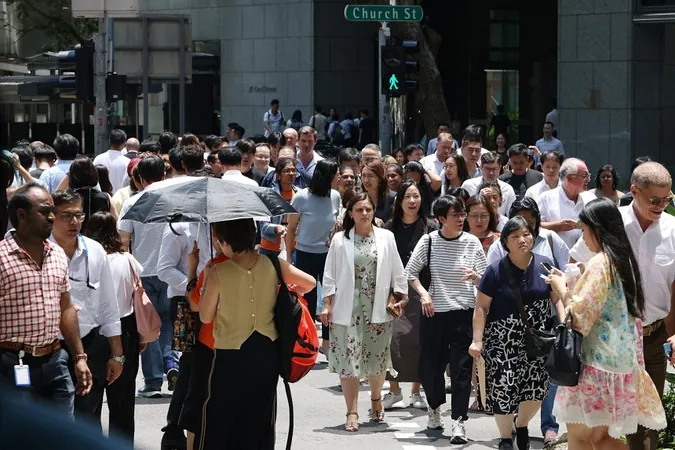
New Fairness Bill Set to Transform Workplace Culture in Singapore: Are You Ready for the Change?
2024-11-12
Author: Rajesh
Introduction of the New Fairness Bill
SINGAPORE – A groundbreaking new workplace fairness Bill has been introduced in Parliament on November 12 to combat discrimination against workers in various areas, including hiring, dismissals, and performance reviews. This legislation aims to reshape the employment landscape and protect employees from unfair practices.
Structure of the Bill
The Bill is divided into two parts: the first outlines principles of worker protection, including the mechanisms for resolving disputes and tackling violations. It was brought to Parliament by Manpower Minister Tan See Leng. The second part, expected to be tabled in 2025, will elaborate on claims procedures and necessitate changes to the Employment Claims Act.
Implementation Timeline
The Ministry of Manpower (MOM) has strategically decided to implement the legislation in two phases, allowing employers ample time to adjust to the new requirements. If approved, both Bills are anticipated to come into effect around 2026 or 2027. This legislation is set to empower employees, making it easier for them to voice grievances about bias without fear of retaliation.
Corrective Actions Against Employers
Significantly, the proposed law delineates corrective actions against employers that violate its provisions. Specifically, employment decisions based on characteristics such as nationality, age, sex, marital status, pregnancy, caregiving responsibilities, race, religion, language, disability, or mental health will be deemed unlawful.
Statistics on Workplace Discrimination
Notably, these traits constitute a staggering 95% of workplace discrimination complaints reported to MOM and the Tripartite Alliance for Fair and Progressive Employment Practices. For the first time, serious breaches may lead to punitive consequences, including hefty fines or civil lawsuits initiated by MOM, with courts empowered to impose stringent penalties on offending employers.
International Context
Upon enactment, Singapore will join international ranks alongside the UK, US, and European Union, all of which have enacted laws addressing workplace discrimination.
Flexibility for Employers
However, to maintain a balance between business flexibility and protective measures, the Bill allows employers to prefer certain traits for specific job roles. For example, hiring exclusively female masseuses for an all-female clientele is permissible, as is hiring interpreters fluent in specified languages. Additionally, religious organizations are exempt from some requirements to respect their unique practices.
Support for Local Workers and Small Businesses
Moreover, actions favoring local workers, disabled workers, or individuals over 55 will not be classified as discriminatory. Small businesses with fewer than 25 employees will be afforded a grace period of five years post-enactment to adjust to the new legal framework, responding to requests from the Singapore National Employers Federation (SNEF) for more time.
Support from SNEF and NTUC
SNEF is committed to supporting companies in developing grievance-handling processes by offering guidance and advice, while the National Trades Union Congress (NTUC) plans to train union leaders to align workers and employers with the new guidelines.
Limitations of the Bill
Despite its comprehensive nature, the proposed legislation has not embraced suggestions to include provisions related to gender orientation or criminal history, nor has it mandated accessibility for disabled individuals in workplaces. Officials have indicated concerns that imposing extensive legal requirements might cultivate a more litigious workplace environment.
Grievance-Handling Procedures
Employers will be required to establish grievance-handling procedures and transparently communicate them to employees. Upon receiving a discrimination complaint, employers must investigate, document the findings, and ensure the confidentiality of the employee who reported the issue, thereby safeguarding against any form of retaliation.
Claims for Victims of Discrimination
Victims of workplace discrimination will have the opportunity to seek claims of up to $20,000—$30,000 for union members. However, frivolous lawsuits may be dismissed, and offending claimants could be ordered to pay costs of up to $5,000 and face disciplinary measures from their employers.
Conclusion: A Shift Towards Fair Employment Practices
The proposed legislation seeks to solidify existing workplace norms and elevate protections, signaling a shift towards a more inclusive and fair employment environment. This law would complement the Tripartite Guidelines on Fair Employment Practices, emphasizing that education and cultural change continue to drive sustainable fair practices in the workplace.
Effects of Previous Initiatives
Recent data from MOM’s Fair Employment Practices 2023 report reveal a dramatic decline in discrimination complaints—falling from 24% to 6% among workers and from 43% to 23% among job seekers between 2018 and 2023, underscoring the effectiveness of ongoing tripartite efforts.
Responses to the Bill
In response to the introduction of the Bill, NTUC expressed support, stating that it would fortify processes for addressing workplace grievances and harassment. SNEF also welcomed the focused approach to penalties, suggesting they offer a more tailored solution compared to previous restrictions primarily targeting work-pass privileges.
Looking Ahead
As Singapore looks forward to a more equitable work environment, the implementation of this landmark legislation could act as a catalyst for change, sparking conversations about fairness, inclusivity, and employee rights in workplaces across the nation. Stay tuned for more updates on this pivotal development!



 Brasil (PT)
Brasil (PT)
 Canada (EN)
Canada (EN)
 Chile (ES)
Chile (ES)
 España (ES)
España (ES)
 France (FR)
France (FR)
 Hong Kong (EN)
Hong Kong (EN)
 Italia (IT)
Italia (IT)
 日本 (JA)
日本 (JA)
 Magyarország (HU)
Magyarország (HU)
 Norge (NO)
Norge (NO)
 Polska (PL)
Polska (PL)
 Schweiz (DE)
Schweiz (DE)
 Singapore (EN)
Singapore (EN)
 Sverige (SV)
Sverige (SV)
 Suomi (FI)
Suomi (FI)
 Türkiye (TR)
Türkiye (TR)